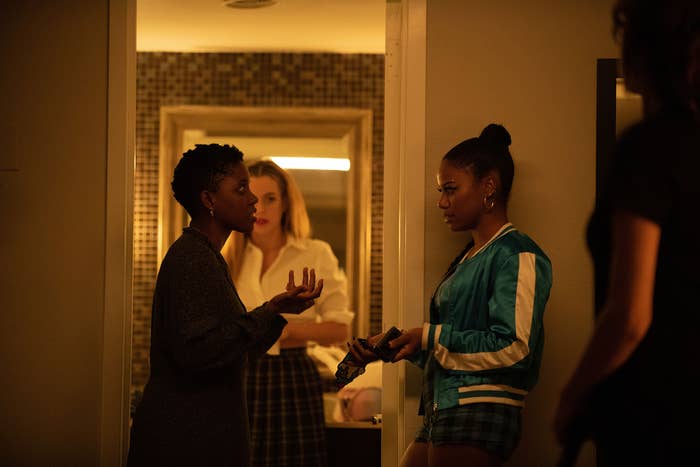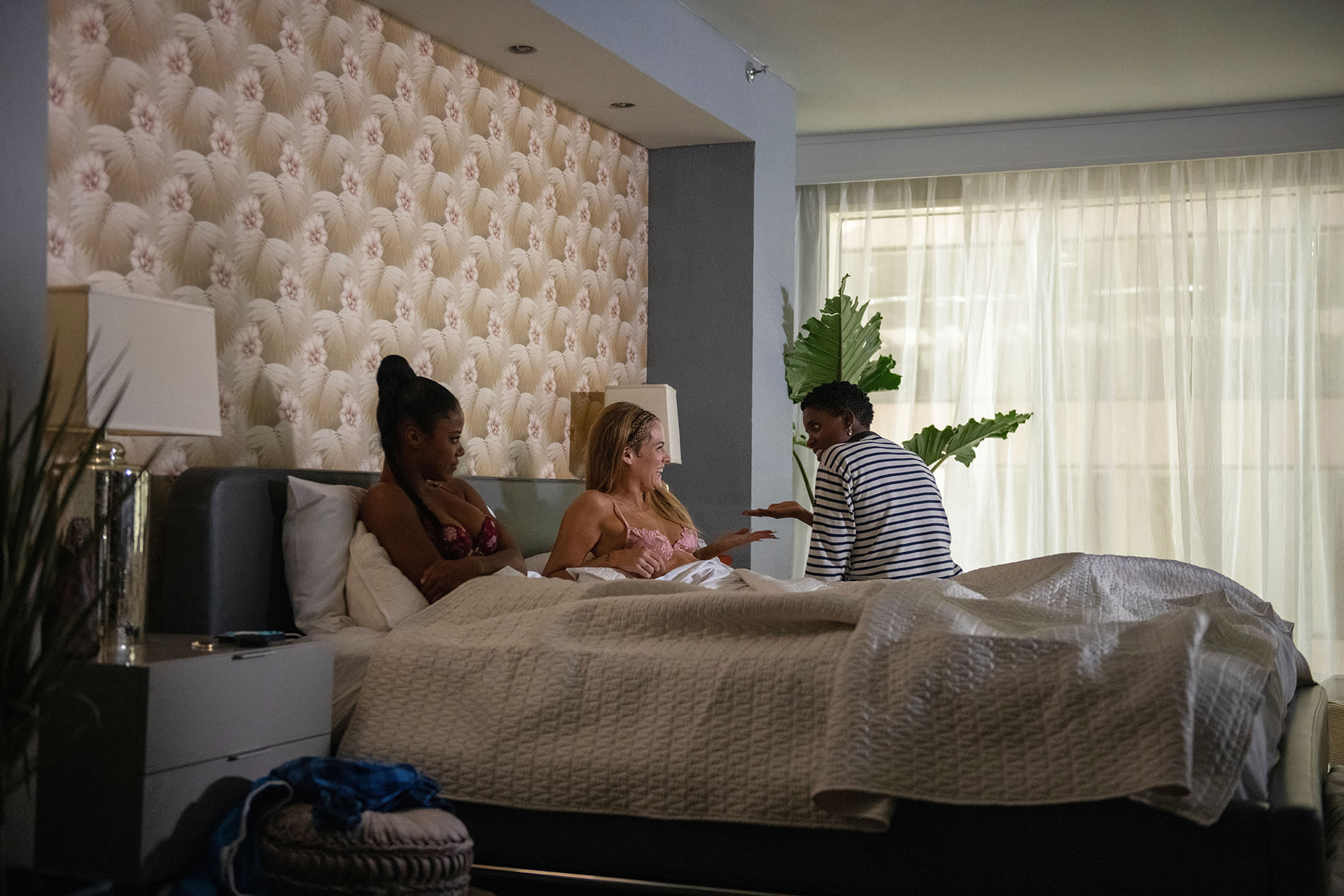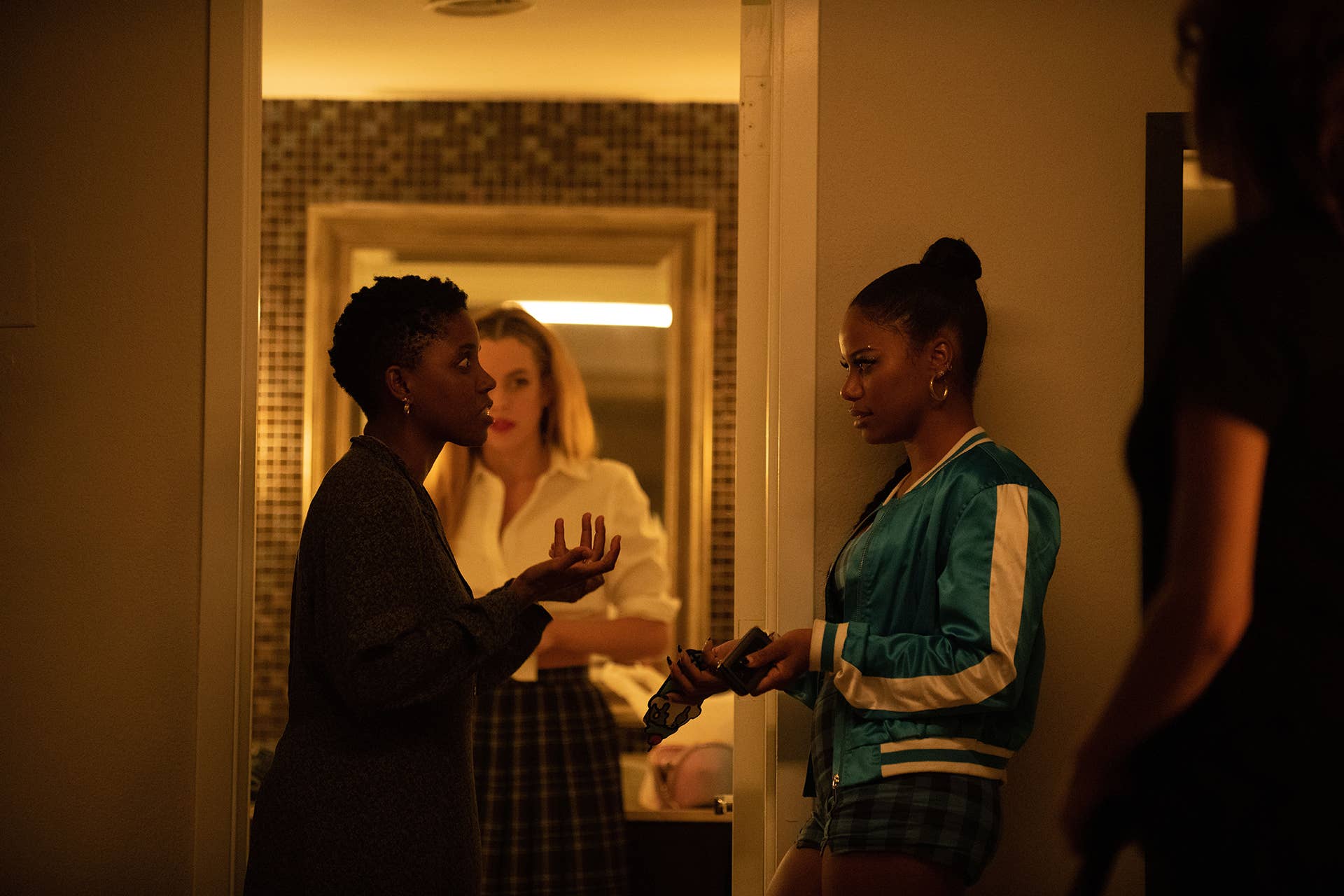
2015 will be remembered for several stranger-than-fiction moments that simply didn’t make sense even by 2020 standards. Somewhere between former president Donald Trump performing a parody of Drake’s “Hotline Bling” on Saturday Night Live and the Kansas City Royals winning the World Series against the New York Mets sat a 100-plus tweet Twitter thread that was “long but full of suspense.” The storyteller was Aziah “Zola” King, a young Detroit waitress with an exotic dancing side hustle who found herself going on a wild adventure in Florida with a woman she’d only known for a day, her boyfriend and pimp.
Unfolding into a narrative that read like a cautionary tale of sex work, getting acclaim from the iconic Oscar-nominated director Ava DuVernaygave the tweets props while Desus Nice joked that then-popular urban drama Empire could “borrow that story.” Within the next couple of days, Black Twitter had mostly had their ideal cast figured out. By the following year, James Franco was slated to direct a film adaptation of the tweets through A24 before his fall from Hollywood grace due to sexual misconduct accusations.
Picking up the director’s mantle for the adaptation was none other than Janicza Bravo, known for directing television episodes of Atlanta and Dear White People alongside films including dark comedy Lemon. Stylized as @zola, the film stars Taylour Paige (Ma Rainey’s Black Bottom) in the titular role, Riley Keough (Mad Max: Fury Road), Colman Domingo (Euphoria), and Nicholas Bruan (Succession). Premiering at 2020 Sundance Film Festival, the film was initially set to be released to theatres before the COVID-19 lockdown and received rave reviews.
With movie theaters beginning to open up, Complex speaks with Bravo about releasing Zola over a year following its premiere, the challenge of adapting tweets to film, and the importance of Black women telling their own stories.
Zola received a positive reaction last year during Sundance, right before the pandemic drastically changed the entire film industry some months later. Can you recall how this affected the film?
I’m so grateful right now to be in this moment. Last year was hard, especially because I premiered at Sundance with a lot of my friends, a lot of my colleagues, and a good percentage of them—their movies got to come out last year. They weren’t released in the way that they had hoped or planned, but they did get to come out. I also can’t speak to their experience. I have a sense that maybe some of that wasn’t exactly satisfying. It wasn’t the way they had imagined it or dreamed it. But they got the release.
And so for me, I’ve been in this kind of ellipsis, waiting to have it leave my body. The arc of making a film when you’re also the writer is having to separate yourself from all of these elements as you move towards actually making the movie. So when I moved from directing, I had to divorce myself from the writing. And then when I went into the edit, I had to divorce myself from the directing. And then when I moved from the edit, then it’s like, the movie is going to come out. And then the sort of final lesson that comes—at each stage there is some lesson, and the final lesson that happens, which is when the movie finally leaves your body and that lesson isn’t, “Did they like it? Did we kill it? Did we make money?” It’s not that. It’s the thing that you are left with. Who are you after the work has left you? And so I’ve been waiting for that. I’ve been waiting to have this moment of reflection and in a way, I feel like an elephant. I feel like I have been carrying for years.
But in terms of the film itself, the film is a tangible object. It is. So if it were released before or now, a year from now, I think the picture itself is less affected and maybe it’s being released into a slightly more generous world. But I don’t know. I can’t say.
Zola’s initial Tweets in 2015 definitely became a talking point for Twitter as a legitimate storytelling medium. Within the 100 plus tweet thread, what were some of the challenges for you and co-writer Jeremy O. Harris to translate from such an unusual medium to film?
I would say the biggest challenge was the Twitter thread itself. Did you read it while it was happening?
Oh, absolutely.
I read it the same day it came out, but I missed the initial part of it because I was working, so I got to it at the end of the day. I got to it before the real Zola deleted it. There’s something so incredibly electric about having been there. It feels like a theater. It feels like you went to a live show, live music, live theater. Like I was there and then did you see when this person, and then did you see that person? And all kinds of famous people showed up to it too, right? Missy Elliot was there, Kiki Palmer was there, Ava DuVernay was there. So I missed that part of it, but I came right on the heels of it.
I would say the most challenging thing for us was, how do we replicate that feeling? How do we replicate that electric thing that happened there, which is a result of the theater? They live in the moment theater. And we just realized, we can’t. We’re not going to, it’s impossible. Like it’s not going to be that. But what does that look like? And I think what that looks like is magnitude, what that looks like is a mountain, a rocket. And so then the world of the film becomes something that is a bit larger than life and approaching it through a lens of absurdity. And that is how I feel we tried our best to match it by doing that.
The initial Zola tweets were this literary blend of Donald Goines, Iceberg Slim, and Karrine Steffans. In your opinion, how did you want to reflect the changes in Black thoughts on modern sex work culture?
I think that I felt like the thing she wrote injected a lot of dignity and self-respect into the women who were doing sex work. And so the judgment that was being brought to her doorstep was very much an individual doing that. I don’t feel she was doing that. So Jeremy and I, when we were approaching the text, what we wanted to do, we just kept going back to the source material. If you ever feel lost, go back to the source material. And what she did was imbue this world with a good deal of dignity. And so I wanted to do that.
I wasn’t really interested in portraying that work as negative. I wasn’t really interested in putting any stank on it, so to speak. That’s not what she did, so why would I do that? And it’s also just…it’s not me. That’s not how I see that. So there was value there and there was integrity and that started with just how you saw those women. And just making a choice, like we’re not going to have naked women in this movie, because as soon as you remove their clothing, the audience is unconsciously losing respect for them. And it’s not because I am losing respect for them, but it’s because the audience is deciding that. As soon as you are exposing yourself in that way, you start to diminish them or demean them.
One of the general ideas of Zola’s initial tweets was the concept of the dangers of sex work. In writing the script, where did you want to deviate or expand from the darker moments of Zola’s Tweets in regards to Colman Domingo as X?
There’s only one thing that I didn’t do that is in the Twitter thread, that I think is maybe what you’re speaking to. There’s a scene where the pimp, which is played by Colman, but in the Twitter thread the pimp has sex with the white woman played by Riley in our world, in front of everyone. I guess I looked at that and I went, well, what is this scene about? This scene is about manhood.
This is about taking someone’s manhood. And so one way to represent that is, I guess, to have a man fuck a woman in front of a room full of people. But like, that’s almost like it’s so obvious. It’s so obvious that it’s not even that sexy to me. It feels kind of basic. And not to say that the Twitter thread is basic. Like for me to represent that feels a little basic and it also feels like I’m leading with my own dick. It feels so masculine and so aggressive. So what is a more curious way to do this? The more curious way, I would say, is for Colman’s character to make it clear that he owns her. And owning someone isn’t just through their genitalia. Owning someone deeply is through their heart. And so what that scene becomes in my film is he puts his hand on her heart and he asks her who that belongs to.
And that is much more painful than having sex with somebody because it becomes disposable. Like, you’ll remember this as some crazy moment where he suddenly fucks the girl and I’m just like, no, it’s deeper than that.

Between tackling the ideas of sex work, there’s a racial component more noticeable with how Stefani talks about a “nappy-headed girl” to Zola’s blank reaction. Initially, James Franco was supposed to direct this film, to the cringe of many on Black Twitter who helped the initial Twitter thread gain so much exposure. How important is it for Black women to tell these types of nuanced stories?
It is very important. I’m not only right for this movie because I am a woman and a person of color. I am a comedy director. This movie is a comedy. It is a dark comedy, and my lane in comedy is specifically stressful comedy. I am more right for it because of that. Being Black and also a woman is just like a bonus on top of a bonus.
Should Black women get to tell these types of stories, absolutely? But I don’t think we should just be throwing any stories at them. I think they should be telling stories that they feel close to. They should be telling stories that they see themselves in. And if they happen to see themselves in a story where the protagonist doesn’t look like them, we should also allow them the room to make that story.
This year you also directed the “COVENANT I” episode of Them which opened with a brilliant explanation of systemic housing discrimination in Los Angeles while delivering the controversial “cat in the bag” moment. Could you explain the difficulty sometimes in telling these kinds of uncomfortable stories about these uncomfortable subjects, just as something as uncomfortable as Zola?
I can’t speak that much to Them because I was a guest director of a single episode that I was invited to direct. I wasn’t in the fold of making the show. I got an offer to do it. I actually had met to do the pilot. I really wanted to direct the pilot. I did not get that job. Months later, I was actually directing Mrs. America as a guest director as well. So I was working on that in Canada and I got the offer to direct the fifth episode of Them. And I said, “yes.” I said yes before I had read it because I really liked Little Marvin and I wanted to be in his world. That whole show and this episode in particular, it’s much bleaker than my own work. Like I said, I am a comedy director and Them is deeply unfunny and it is also really scary. It’s a kind of scary that isn’t exactly in my tonality.
Regarding the line that it tread, I was hired to do a job. I did my homework. I did the research, and I took care of the lead actress, Debra Ayorinde. That was what I was there to do—to make sure that she felt safe and to make sure that her narrative was being taken care of inside of this show. That’s what I was there to do and I think that I did it. I mean, people seem to have been really affected by it and that makes sense. I think one conversation that stemmed from that was the necessity of these kinds of stories. There aren’t enough of us Black storytellers out there. There still aren’t enough. And I think that there ought to be room for a multitude of stories. I think Little Marvin wanted to tell that story is totally valid and it’s also valid that it didn’t work for some of the audience, but both of those things should get to co-exist.
Regarding Zola and the tonality of Zola, it does tread the line of uncomfortable, terrifying or suspenseful, and also funny. And I can’t explain the formula of why that works. It just does for me. I think so much of why I find myself moving through that space very comfortably has so much to do with actually how I am and who I am in my body, that I am moving through the world as a Black woman and am put in situations where I am expected to ask permission to be there or I am expected to be grateful or I’m often not considered. So I have a very rich interior life. So I found so much of myself in that character and I think I can just weave that sensibility with ease because it’s a part of how I move through the world.


